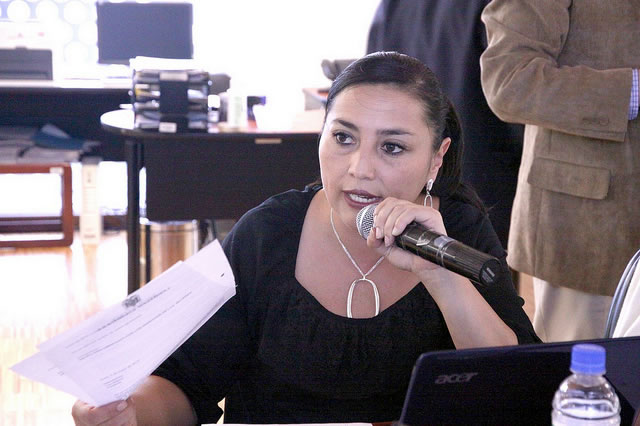
On 20 March 2017, the Justice Committee of the National Assembly of Ecuador held a Hearing to discuss the reforms introduced by Dip. Marisol Peñafiel, PGA Member, to amend the Organic Integral Criminal Code (COIP) aimed at implementing the crimes and principles under the Rome Statute as well as the cooperation mechanisms with the International Criminal Court (ICC) into Ecuadorian Law. Dip. Ronny Monge Salas (Costa Rica), PGA Board Member and Dr. David Donat Cattin, PGA Secretary-General, were heard at hearing, together with Ms. Michelle Reyes, Coordinator for the Americas of the Coalition for the International Criminal Court (CICC), and Mr. Juan Hernández, Coordinator of Prevention Programs of the International Committee of the Red Cross (ICRC).
Since 2002, PGA has been working with its Ecuadorian Members on the domestic implementation of the Rome Statute of the International Criminal Court (ICC). After the participation of two prominent Ecuadorian Legislators in PGA’s Workshop on the Challenges of the Rome Statute in the Americas in September 2012, PGA provided technical assistance to modify the draft bill that amended the Criminal and Criminal Procedural Codes, including the definition of crimes against humanity. On 10 February 2014, the Organic Code was adopted by the National Assembly and several PGA recommendations were included in the Law.
As the Organic Code was re-opened for amendments, Dip. Peñafiel introduced a complex set of amendments in December 2014 taking into consideration comments received from PGA as well as civil society organizations to make the code fully adherent to the provisions of the Rome Statue, in light of the deliberations of PGA’s the 2014 session of the Workshop on the Challenges of the Rome Statute in the Americas held in Uruguay’s Parliament.
States Parties to the Rome Statute must implement cooperation mechanisms with the ICC, as the Court depends on States to carry-out its mandate and enforce its decisions. In line with the country’s international obligations, Dip. Peñafiel’s draft law creates the necessary mechanisms to cooperate with the ICC under Article 88, Rome Statute. The draft law implements, inter alia, the provisions of the Agreement on Privileges and Immunities of Court’s officials, the enforcement of sentences and the offenses against administration of justice. In respect of all forms of cooperation with the ICC, this Draft Bill takes into account most elements of PGA´s “Reference Law” on cooperation with the ICC for Latin American States.
The Hearing before the Justice Committee took place after the introduction for consultation on 20 September 2016 of the bill reforming the Organic Criminal Code [COIP, Codigo Organico Integral Penal] and the strong statement during PGA’s CAP-ICC in Dakar in support of the Rome Statute and its implementation by Asambleista Peñafiel, who pledged to advance the implementation process in her country.
On behalf of PGA, Dip. Monge emphasized the importance and described the characteristics of the principle of complementarity, which informs the relationship between National jurisdictions and the ICC’s mandate, and the general obligation of States Parties to cooperate with the Court. Dip. Monge is a main proponent in Costa Rica of Draft bills number 19.665 and number 4573 respectively establishing cooperation mechanisms with the ICC and implementing the crimes included in the Rome Statute as well as the Kampala Amendments. While referring to the legislative process in Costa Rica, Dip. Monge commended Ecuador for the progress accomplished on the implementation of the Rome Statute.
Dr. Donat Cattin focused on specific cooperation mechanism pertaining to the protection of the victims and witnesses, victims’ participation in the proceedings, reparations, procedures for the arrest and surrender of persons to the Court and their intrinsic difference with extradition, execution of sentences in Ecuador and channels of communications between the ICC and national authorities. PGA’s Secretary-General welcomed the Hearing on the amendments to the Organic Code and reminded that the approval of the proposed Amendments by the Committee would be a step towards further strengthening the national legal order of Ecuador, which already contains most of the substantive law provisions contained in the Rome Statute.
Two other expert presentations, respectively from the CICC and the ICRC respectively focused on the Amendments regarding the principles and crimes under the Rome Statute and the inclusion of certain acts constitutive of war crimes, crimes against humanity and the Kampala Amendment on the crime of aggression.
PGA looks forward to continue to cooperate with Ecuadorian Lawmakers in the process towards the approval by Parliament of the Draft Amendment to the Criminal Code as this legislative reform would not only contribute to the fight against impunity domestically, but also would send a clear signal that Ecuador continues to support international justice by fully complying with its obligations as State Party to the Rome Statute.



